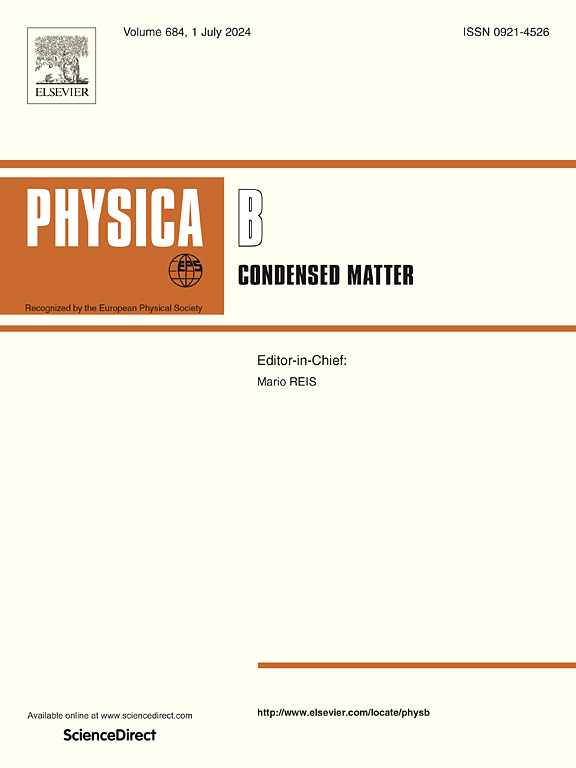Relativistic band gap engineering in Eu-doped Pr2O3: A DFT-based GGA+U+SOC first-principles study to enhance the electronic, optical, and thermoelectric properties for next-generation phosphor-converted LED materials
IF 2.8
3区 物理与天体物理
Q2 PHYSICS, CONDENSED MATTER
引用次数: 0
Abstract
This study explores the effects of europium (Eu) doping on the optical electronic and thermoelectric properties of praseodymium oxide (Pr2O3). Two doping concentrations, 1.25% (Eu-Pr2O3) and 2.5% (2Eu-Pr2O3), are analyzed using first-principles DFT based calculations with GGA+U+SOC approach. The band gap of pristine Pr2O3 decreases from 3.31 eV to 2.54 eV at 1.25% and 2.44 eV at 2.5% Eu doping concentration. Formation energy calculations confirm the thermodynamic stability of all materials. Optical properties analysis shows enhanced ultraviolet absorption and visible transparency, suggesting potential applications in phosphor-converted LEDs (PC-LEDs). Thermoelectric analysis indicates reduced thermal conductivity due to Eu doping, with modest changes in electrical conductivity. The Seebeck coefficient exhibits an n-type to p-type shift based on temperature and doping level, with higher ZT values observed at lower temperatures for single Eu doping.
铕掺杂Pr2O3的相对论带隙工程:基于dft的GGA+U+SOC第一性原理研究,以提高下一代磷转换LED材料的电子、光学和热电性能
本研究探讨了铕(Eu)掺杂对氧化镨(Pr2O3)光电子和热电性能的影响。采用基于第一性原理DFT的GGA+U+SOC方法,分析了1.25% (Eu-Pr2O3)和2.5% (2Eu-Pr2O3)两种掺杂浓度。原始Pr2O3的带隙从3.31 eV减小到1.25%时的2.54 eV和2.5%时的2.44 eV。地层能量计算证实了所有材料的热力学稳定性。光学特性分析显示增强的紫外线吸收和可见光透明度,表明在磷转换led (pc - led)中的潜在应用。热电分析表明,由于Eu掺杂,导热系数降低,电导率变化不大。Seebeck系数随温度和掺杂水平的变化呈现出从n型到p型的变化,单个Eu掺杂温度越低,ZT值越高。
本文章由计算机程序翻译,如有差异,请以英文原文为准。
求助全文
约1分钟内获得全文
求助全文
来源期刊

Physica B-condensed Matter
物理-物理:凝聚态物理
CiteScore
4.90
自引率
7.10%
发文量
703
审稿时长
44 days
期刊介绍:
Physica B: Condensed Matter comprises all condensed matter and material physics that involve theoretical, computational and experimental work.
Papers should contain further developments and a proper discussion on the physics of experimental or theoretical results in one of the following areas:
-Magnetism
-Materials physics
-Nanostructures and nanomaterials
-Optics and optical materials
-Quantum materials
-Semiconductors
-Strongly correlated systems
-Superconductivity
-Surfaces and interfaces
 求助内容:
求助内容: 应助结果提醒方式:
应助结果提醒方式:


